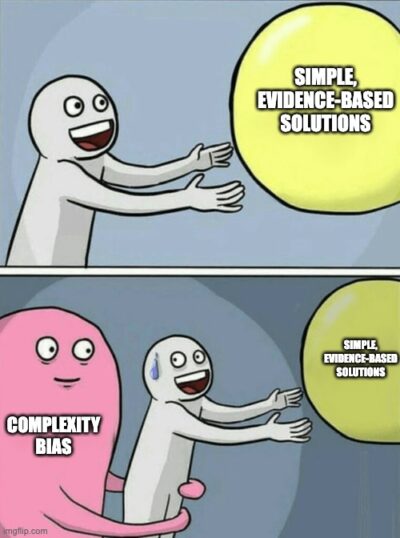
Overcome Complexity Bias to Amplify Your Autoimmune Health
Ever find yourself caught in the web of overcomplicating the simplest things? Remember when making a cup of coffee was just… making coffee? Now it feels like a mad scientist’s experiment! Well, fret not, because we’re diving into the world of autoimmune health journeys and giving “complexity bias” a run for its money!
You’ve probably been there – drowning in a sea of questions like, “Should I buy regular blueberries or splurge on the organic ones?”
“When’s the magical time to devour that nutrient-dense AIP meal?”
“How many minutes of red light therapy will grant me autoimmune superhero powers?”
And let’s not forget the allure of cold plunging, thanks to Instagram influencers! (But seriously, should we be doing this??)
In our quest for optimal health, especially for our autoimmune conditions, it’s easy to get lost in the sea of information, diets, supplements, and treatments. This complexity bias can lead us down a rabbit hole of options, often leaving us more confused and overwhelmed than when we started. The irony? This complexity can actually hinder our healing journey.
Can it all be really so simple?
Complexity bias isn’t just about making life harder for ourselves; it’s about how our brains are wired. When faced with the vast, often conflicting information about autoimmune health, our brains think, “If it’s more complicated, it must be more effective,” which isn’t always the case. It’s like believing you need to climb Mount Everest to get fit when a daily walk in the park would do.
So, to answer the question: Yes, it can all be so simple. Shifting our perspective from complexity to simplicity doesn’t mean we’re taking shortcuts or ignoring the nuances of autoimmune health.
Rather, it means we’re focusing on the foundational elements that truly make a difference in our well-being. It’s about finding the core actions that bring about real change and sticking to them with consistency and faith.
Complexity Bias in the Health Space
Diving into the maze of health and wellness, let’s unravel the tangles of complexity bias and explore the misconceptions that might be steering your journey without you even realizing it.
- Jargon and Technical Terms: Throwing around scientific terms and complex-sounding ingredients creates an illusion of sophistication and authority.
- Multitude of Features: Highlighting a long list of ingredients or functionalities can overwhelm consumers, making them believe the product is “more complete” than simpler alternatives.
- Unclear Explanations: Using vague or overly technical language to explain how a product works makes it harder for consumers to critically evaluate its effectiveness.
- Cherry-Picked Science: Citing isolated studies or highlighting specific aspects of research to overemphasize benefits while downplaying potential risks or limitations.
- Celebrity Endorsements: Celebrities, especially those with no relevant expertise, can lend an air of credibility to complex products, influencing consumers through association, not knowledge.

Really, why do we do this? 😅
How to Spot Complexity Bias:
- Do your research: Look beyond marketing claims and consult independent sources, such as scientific reviews or consumer advocacy groups, to understand the evidence behind ingredients and features.
- Question jargon: Don’t be afraid to ask companies for clear explanations of scientific terms or technical features. If they can’t explain it simply, it might be a red flag.
- Compare apples to apples: When comparing products, focus on core functionalities and evidence-based benefits, not just the number of features or complexity of ingredients.
- Be wary of quick fixes: Complex products rarely offer the miracle cures they promise. Be skeptical of solutions that seem too good to be true, especially if they lack strong scientific backing.
- Trust your gut: If something feels overly complicated or too good to be true, it probably is. Don’t let marketing pressure cloud your judgment; choose products based on clear understanding and genuine need.
By being aware of complexity bias and employing these tips, you can make informed decisions about your health and wellness, avoiding the hype and focusing on what truly matters: evidence-based solutions that align with your individual needs.
Simple Is Best: A Path to Better Health
The antidote to complexity bias is simplicity. Here’s how you can apply it to boost your autoimmune health:
- Start with Your Plate: Think ‘less is more.’ Instead of jumping on every diet bandwagon, start by simplifying your diet. Focus on whole foods and eliminate processed ones. Imagine your diet as a serene, uncluttered room where everything you ingest nourishes and supports your health.
- Streamline Your Routine: Exercise doesn’t need to be a complicated affair involving the latest fitness trends. A simple, consistent routine like walking, yoga, or light stretching can significantly impact your health.
- Declutter Your Mind: Stress management is crucial in autoimmune health. Simplify your approach by incorporating mindfulness or meditation into your daily routine.
- Quality Over Quantity in Supplements and Medications: Consult with healthcare professionals to focus on what’s truly essential for your condition, rather than piling up on every supplement touted by Dr. Internet.
- Embrace the Power of No: Simplify your life by setting boundaries and prioritizing your health. It’s okay to say no to obligations that stress you or hinder your health journey.
- Educate Yourself, simply: Seek out information from credible, straightforward sources. Simplification doesn’t mean ignorance; it means understanding the core of what’s beneficial for you.
- Tap into the Power of Community like BrightlyThrive™: Don’t underestimate the strength and simplicity found in seeking support from others who are navigating similar health journeys. This connection can simplify your journey by providing you with practical advice, emotional support, and a sense of belonging, all of which can significantly lighten the load.

Remember, the goal is to simplify to amplify. By reducing the complexity in managing your autoimmune condition, you amplify the effectiveness of your efforts, leading to a healthier, more vibrant you.
Consistency Not Complexity
How many times have we found ourselves caught in the whirlwind of the latest health trends, jumping from one complex regimen to another, hoping for a magic bullet?
Unfortunately, it’s a common tale in the journey of autoimmune management, where the allure of a new diet, a revolutionary supplement, or an advanced workout plan can make us believe that complexity equals effectiveness.
Yet, the truth lies in a far simpler, albeit less glamorous principle: consistency.
The Power of Consistency in Healing
The real secret to amplifying your autoimmune health isn’t found in the complexity of the solutions we adopt but in the consistency with which we apply simple, effective habits over time. It’s the daily choices, the small steps taken regularly, that build up and create lasting change. Let’s explore why consistency trumps complexity every single time:
- Builds Sustainable Habits: Consistency turns beneficial practices into habits, making them part of your lifestyle rather than a chore. It’s like watering a plant regularly – simple care, profound growth.
- Reduces Overwhelm: By focusing on a few key practices and sticking to them, you reduce the mental clutter and anxiety that often come with trying to manage too many things at once.
- Allows for Real Measurement of What Works: When you’re consistent with your health practices, it’s easier to track what’s truly working for you and what’s not. It’s akin to conducting a clean experiment where the variables are controlled, giving you clear results.
- Enhances Adaptability: Consistent practice in a few areas allows you to better adapt to changes, whether it’s tweaking your diet or adjusting your exercise routine.
- Fosters Patience and Resilience: The consistency approach teaches patience and builds resilience, as you’re not constantly looking for quick fixes but rather investing in the long-term improvement of your health. It’s the difference between sprinting and running a marathon; the latter requires steady pace and endurance.
Embracing Consistency in Your Journey
To truly embrace consistency, start by identifying one or two key areas where you can apply this principle. It could be as simple as committing to a 10-minute daily walk, meditating each morning, or ensuring you’re hydrated throughout the day. Celebrate the small victories, and remember, every step taken consistently is a step toward amplified health.
In a world that often celebrates complexity and quick fixes, choosing simplicity and consistency is a radical act of self-care. It’s acknowledging that the journey to better health isn’t about the most complicated path but the one you can follow with dedication and perseverance.
So, let’s raise a glass (of water, steeped with a slice of lemon for that simple, healthful touch) to simplifying our approach to autoimmune health. Here’s to a journey marked not by the weight of unnecessary complexities but by the lightness of simplicity and the profound impact it can have on our health!

Resources
Street, F. (2020, June 6). Complexity Bias: Why We Prefer Complicated to Simple. Farnam Street.
Newport, S. (2022, May 10). Overcoming Complexity Bias – Stop flirting with complexities and fall in love with simplicity — The Room – Psy. The Room – Psy.
Why we’re hardwired to love the hustle (hint: it’s complicated) – Work Life by Atlassian. (2024, January 31). Work Life by Atlassian.
Cunff, A. L. L. (2021, September 12). The power of simplicity: how to manage our complexity bias. Ness Labs.
TAGS:
CATEGORIES:








